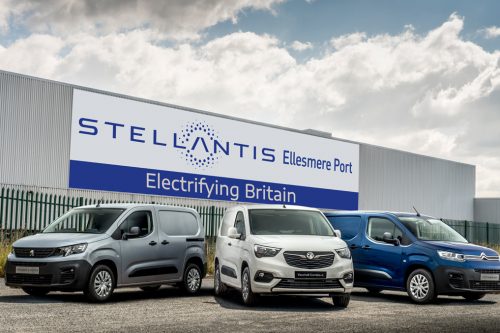Rocky road for motor manufacturer Stellantis as revenues and profits hit brakes

Motor manufacturer and owner of the former Vauxhall Ellesmere Port car plant, Stellantis, has posted reduced revenues and profits for the six months to June 30, 2024.
The Ellesmere Port plant employs around 1,000 staff who have switched from producing the Vauxhall marque’s Astra model to a new range of electric vehicle (EV) vans.
Net revenues were €85.017bn, down from €98.368bn the previous year.
The group, which comprises the Citroen, Fiat, Jeep and Peugeot brands, made a pre-tax profit of €8.989bn, which compares with €13.541bn the previous year.
Restructuring costs across the group during the six months ended June 30, 2024 increased by 119.6% to €1.212bn, compared with the corresponding period in 2023, which was primarily due to workforce reduction plans in the group’s Enlarged Europe region.
Total available liquidity currently stands at €55.654bn, which is down from €62.610bn a year ago.
Total debt stood at €32.174bn, compared with €29.463bn at December 31, 2023.
The group said it has revised its 2024 financial guidance reflecting decisions to significantly enlarge remediation actions on North American performance issues, as well as deterioration in global industry dynamics.
Actions include North American shipment declines of more than 200,000 vehicles in the second half of 2024 (up from 100,000 prior guidance), compared with the prior year period, increased incentives on 2024 and older model year vehicles, and productivity improvement initiatives that encompass both cost and capacity adjustments.
Stellantis said: “Deterioration in the global industry backdrop reflects a lower 2024 market forecast than at the beginning of the period, while competitive dynamics have intensified due to both rising industry supply, as well as increased Chinese competition.”
The company’s updated 2024 market outlook and financial guidance now envisages and adjusted operating income (AOI) margin of between 5.5-7% for the 2024 fiscal year period, down from prior “double digit”.
Roughly two-thirds of the reduced AOI margin is driven by corrective actions in North America. Other contributors include lower than expected sales performance in the second half of the year across most regions.
Industrial free cash flow is expected to range from -€5bn to -€10bn, from prior “Positive”. This primarily reflects the substantially lower AOI outlook as well as the impact of temporarily elevated working capital in the second half of 2024.
The company said it will continue to leverage and expand its competitive differentiators and believes that the recovery actions being put in place will ensure stronger operational and financial performance in 2025 and beyond.
Russ Mould, investment director at Manchester-based investment platform, AJ Bell, said: “A slowdown in the global automotive sector and having to spend big on revitalising two core brands have put a dent in Stellantis’ bonnet. The hazard lights were flashing on its share price as investors baulked at the scale of the warning.
“Trying to make the Jeep and Dodge brands fit for the modern age is a challenge in itself, let alone trying to do it in a market where consumers are less willing to upgrade their vehicle because of financial constraints or concerns.
“Competition is also brutal, including a concerted effort by Chinese auto companies to grab market share around the world.”
He added: “This is further evidence that the auto industry is going through one of its toughest patches in years. Vehicle manufacturers have ploughed millions of dollars into developing electric vehicles as the industry experiences its biggest transformation in decades. Unfortunately, buyers haven’t come out in force, leaving the manufacturers in a tricky spot.
“Drivers want prices to come down on electric vehicles and charging infrastructure to improve; manufacturers are cutting prices but they don’t want to go too far as they need to avoid diluting margins too much. At some point balance will be restored in the market, but for now, the warning from Stellantis is not an isolated incident for the industry.”
In June this year Stellantis warned that its Ellesmere Port plant could face closure, due to rules over electric car production.
Consumer demand for electric vehicles (EVs) is currently low, and if more aren’t bought, manufacturers will be in breach of UK regulations.
The law states that fully electric cars, and not hybrids, must make up 22% of all manufacturers’ sales.
According to Society of Motor Manufacturers and Traders figures, just 16% of sales are EVs.
Stellantis managing director, Maria Grazia Davino, said at an industry event in June: “The fact is that demand is not there.”








